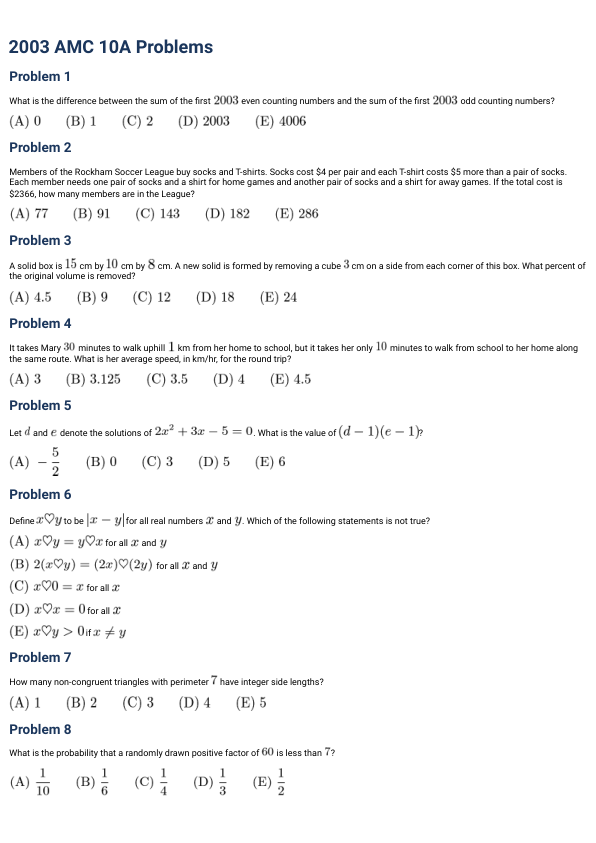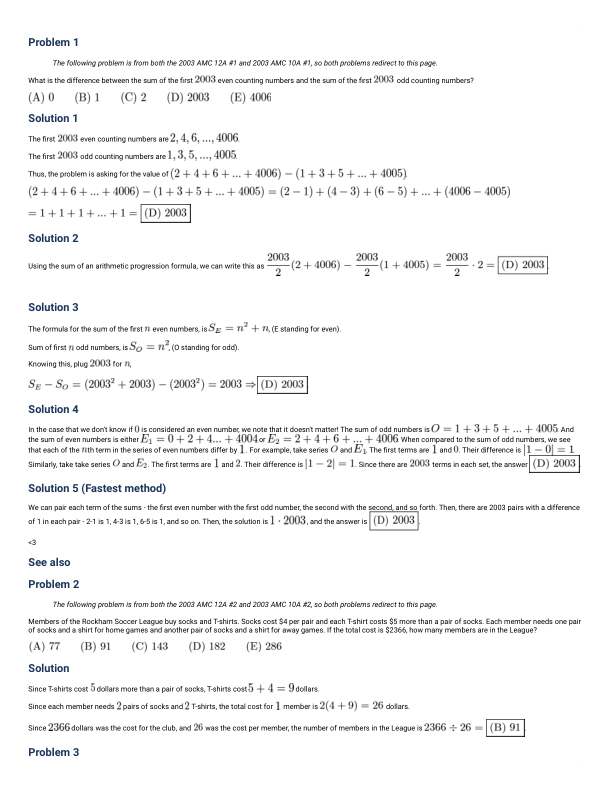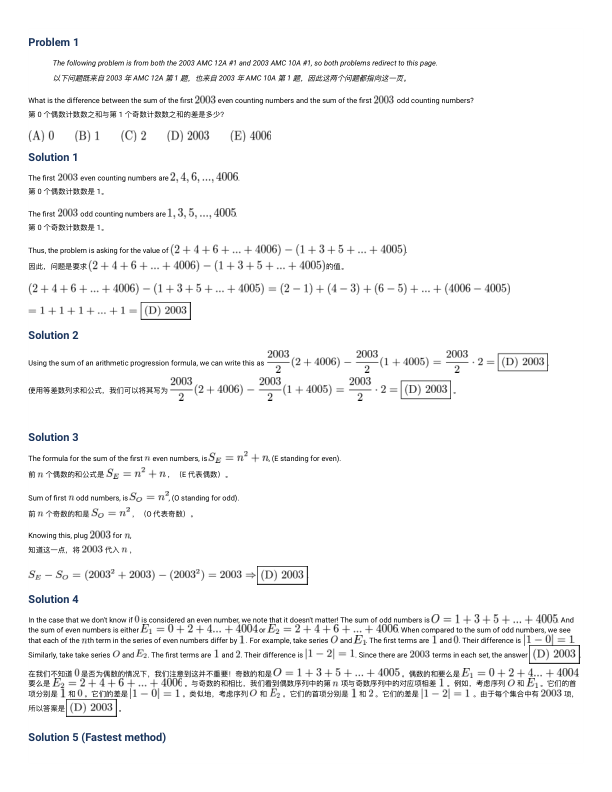2003 AMC amc10a 真题 答案 详解
| 序号 | 文件列表 | 说明 | ||
|---|---|---|---|---|
| 1 | 2003-amc10a-paper-eng.pdf | 4 页 | 192.19KB | 英文真题 |
| 2 | 2003-amc10a-key.pdf | 1 页 | 10.12KB | 真题答案 |
| 3 | 2003-amc10a-solution-eng.pdf | 16 页 | 1.08MB | 真题文字详解(英文) |
| 4 | 2003-amc10a-solution-eng-zh.pdf | 25 页 | 1.26MB | 真题文字详解(中英双语) |
英文真题
2003 AMC 10A Problems Problem 1 What is the difference between the sum of the first 2003 even counting numbers and the sum of the first 2003 odd counting numbers? (A) 0 (B) 1 (C) 2 (D) 2003 (E) 4006 Problem 2 Members of the Rockham Soccer League buy socks and T-shirts. Socks cost $4 per pair and each T-shirt costs $5 more than a pair of socks. Each member needs one pair of socks and a shirt for home games and another pair of socks and a shirt for away games. If the total cost is $2366, how many members are in the League? (A) 77 (B) 91 (C) 143 (D) 182 (E) 286 Problem 3 A solid box is 15 cm by 10 cm by 8 cm. A new solid is formed by removing a cube 3 cm on a side from each corner of this box. What percent of the original volume is removed? (A) 4.5 (B) 9 (C) 12 (D) 18 (E) 24 Problem 4 It takes Mary 30 minutes to walk uphill 1 km from her home to school, but it takes her only 10 minutes to walk from school to her home along the same route. What is her average speed, in km/hr, for the round trip? (A) 3 (B) 3.125 (C) 3.5 (D) 4 (E) 4.5 Problem 5 Let d and e denote the solutions of 2x^2 + 3x - 5 = 0. What is the value of (d - 1)(e - 1)? (A) -5/2 (B) 0 (C) 3 (D) 5 (E) 6 Problem 6 Define x♡y to be |x - y| for all real numbers x and y. Which of the following statements is not true? (A) x♡y = y♡x for all x and y (B) 2(x♡y) = (2x)♡(2y) for all x and y (C) x♡0 = x for all x (D) x♡x = 0 for all x (E) x♡y > 0 if x ≠ y Problem 7 How many non-congruent triangles with perimeter 7 have integer side lengths? (A) 1 (B) 2 (C) 3 (D) 4 (E) 5 Problem 8 What is the probability that a randomly drawn positive factor of 60 is less than 7? (A) 1/10 (B) 1/6 (C) 1/4 (D) 1/3 (E) 1/2

真题文字详解(英文)
Problem 1 The following problem is from both the 2003 AMC 12A #1 and 2003 AMC 10A #1, so both problems redirect to this page. What is the difference between the sum of the first 2003 even counting numbers and the sum of the first 2003 odd counting numbers? (A) 0 (B) 1 (C) 2 (D) 2003 (E) 4006 Solution 1 The first 2003 even counting numbers are 2, 4, 6, ..., 4006. The first 2003 odd counting numbers are 1, 3, 5, ..., 4005. Thus, the problem is asking for the value of (2 + 4 + 6 + ... + 4006) - (1 + 3 + 5 + ... + 4005). (2 + 4 + 6 + ... + 4006) - (1 + 3 + 5 + ... + 4005) = (2 - 1) + (4 - 3) + (6 - 5) + ... + (4006 - 4005) = 1 + 1 + 1 + ... + 1 = (D) 2003 Solution 2 Using the sum of an arithmetic progression formula, we can write this as 2003/2(2 + 4006) - 2003/2(1 + 4005) = 2003/2 · 2 = (D) 2003 Solution 3 The formula for the sum of the first n even numbers, is SE = n^2 + n, (E standing for even). Sum of first n odd numbers, SO = n^2, (O standing for odd). Knowing this, plug 2003 for n. SE - SO = (2003^2 + 2003) - (2003^2) = 2003 => (D) 2003 Solution 4 In the case that we don't know if 0 is considered an even number, we note that it doesn't matter! The sum of odd numbers is O = 1 + 3 + 5 + ... + 4005. And the sum of even numbers is either E1 = 0 + 2 + ... + 4004 or E2 = 2 + 4 + 6 + ... + 4006. When compared to the sum of odd numbers, we see that each of the nth term in the series of even numbers differ by 1. For example, take series O and E1. The first terms are 1 and 0. Their difference is |1 - 0| = 1 Similarly, take series O and E2. The first terms are 1 and 2. Their difference is |1 - 2| = 1. Since there are 2003 terms in each set, the answer is (D) 2003 Solution 5 (Fastest method) We can pair each term of the sums - the first even number with the first odd number, the second with the second, and so forth. Then, there are 2003 pairs with a difference of 1 in each pair - 2-1 is 1, 4-3 is 1, 6-5 is 1, and so on. Then, the solution is 1 · 2003, and the answer is (D) 2003 <3 See also Problem 2 The following problem is from both the 2003 AMC 12A #2 and 2003 AMC 10A #2, so both problems redirect to this page. Members of the Rockham Soccer League buy socks and T-shirts. Socks cost $4 per pair and each T-shirt costs $5 more than a pair of socks. Each member needs one pair of socks and a shirt for home games and another pair of socks and a shirt for away games. If the total cost is $2366, how many members are in the League? (A) 77 (B) 91 (C) 143 (D) 182 (E) 286 Solution Since T-shirts cost $5 dollars more than a pair of socks, T-shirts cost $5 + $4 = $9 dollars. Since each member needs 2 pairs of socks and 2 T-shirts, the total cost for 1 member is 2($4 + $9) = $26 dollars. Since $2366 was the cost for the club, and $26 was the cost per member, the number of members in the League is $2366 ÷ $26 = (B) 91 Problem 3

真题文字详解(中英双语)
Problem 1 The following problem is from both the 2003 AMC 12A #1 and 2003 AMC 10A #1, so both problems redirect to this page. What is the difference between the sum of the first 2003 even counting numbers and the sum of the first 2003 odd counting numbers? (A) 0 (B) 1 (C) 2 (D) 2003 (E) 4006 Solution 1 The first 2003 even counting numbers are 2, 4, 6, ..., 4006. The first 2003 odd counting numbers are 1, 3, 5, ..., 4005. Thus, the problem is asking for the value of (2 + 4 + 6 + ... + 4006) - (1 + 3 + 5 + ... + 4005). (2 + 4 + 6 + ... + 4006) - (1 + 3 + 5 + ... + 4005) = (2 - 1) + (4 - 3) + (6 - 5) + ... + (4006 - 4005) = 1 + 1 + 1 + ... + 1 = (D) 2003 Solution 2 Using the sum of an arithmetic progression formula, we can write this as 2003/2(2 + 4006) - 2003/2(1 + 4005) = 2003/2 * 2 = (D) 2003 Solution 3 The formula for the sum of the first n even numbers is SE = n^2 + n, (E standing for even). Sum of first n odd numbers is SO = n^2, (O standing for odd). Knowing this, plug 2003 for n, SE - SO = (2003^2 + 2003) - (2003^2) = 2003 => (D) 2003 Solution 4 In the case that we don't know if 0 is considered an even number, we note that it doesn't matter! The sum of odd numbers is O = 1 + 3 + 5 + ... + 4005. And the sum of even numbers is either E1 = 0 + 2 + ... + 4004 or E2 = 2 + 4 + 6 + ... + 4006. When compared to the sum of odd numbers, we see that each of the nth term in the series of even numbers differ by 1. For example, take series O and E1. The first terms are 1 and 0. Their difference is |1 - 0| = 1. Similarly, take series O and E2. The first terms are 1 and 2. Their difference is |1 - 2| = 1. Since there are 2003 terms in each set, the answer is (D) 2003 Solution 5 (Fastest method)

